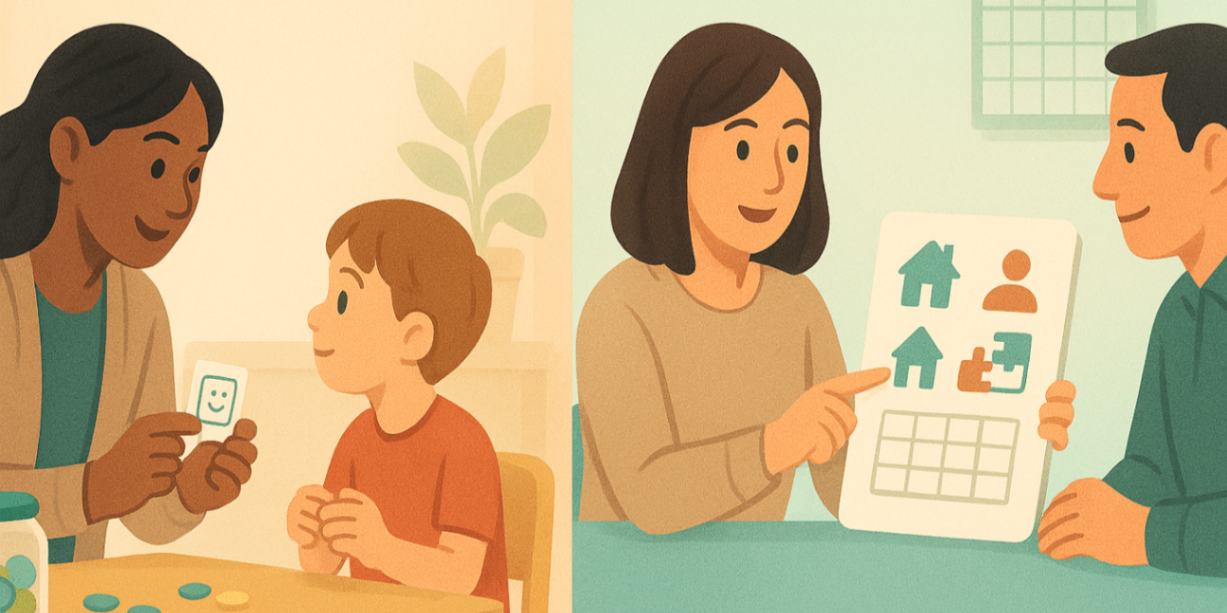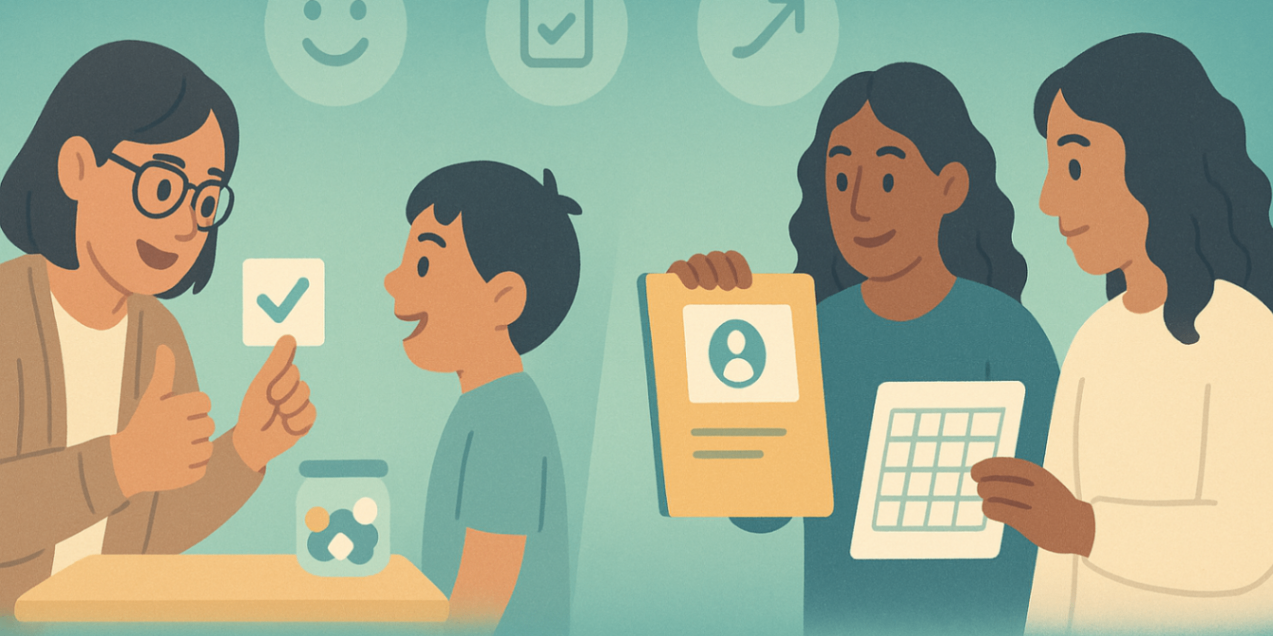
behaviour therapist vs behaviour support: key differences
29 August, 2025
Latest Update: November 19, 2025
If your child needs skill teaching and one-to-one intervention, a behaviour therapist (Liverpool) is usually best. If your child has complex or high-risk behaviours that need a comprehensive plan, a behaviour support practitioner creates and oversees the long-term positive behaviour support plan. Many families benefit from both working together under NDIS behaviour support funding.
Key Highlights
-
A behaviour therapist focuses on implementing intervention plans to teach new skills under the supervision of a Certified Behaviour Analyst.
-
A behaviour support practitioner develops comprehensive support plans, especially for individuals with complex or high-risk challenging behaviours.
-
The NDIS provides funding for both types of support to improve a person’s quality of life.
-
Positive behaviour support (PBS) is a core framework used by practitioners to understand the reasons behind behaviours.
-
The primary goal of both roles is to address behaviours of concern, but their scope and methods differ significantly.
-
Choosing the right professional depends on your child’s specific needs and the complexity of the support plan required.
Why Parents in Liverpool Ask This Question

Finding the right help when a child shows behaviours of concern can be confusing. Job titles like behaviour therapist Liverpool, behaviour support practitioner, and NDIS behaviour support are used a lot, so parents often don’t know which professional will best meet their child’s needs. This guide clarifies the difference so you can choose the most effective path forward.
Role Clarity & Regulatory Context
In 2025, distinctions between a behaviour therapist and a behaviour support practitioner are more important than ever — especially because of evolving regulatory requirements under the NDIS. The NDIS Quality & Safeguards Commission confirms that behaviour support practitioners must be deemed suitable and meet the Positive Behaviour Support Capability Framework.
This means:
-
Behaviour support practitioners can conduct Functional Behaviour Assessments (FBAs) and develop Behaviour Support Plans (BSPs).
-
Behaviour therapists implement the plans under supervision but do not design the BSPs themselves.
Understanding these roles helps families match the right professional to their child’s needs.
How Each Role Relates to Your NDIS Plan
When choosing between a behaviour therapist and behaviour support practitioner, knowing how each fits into your child’s NDIS plan is critical:
-
-
Behaviour Therapist: Suits children who already have a Behaviour Support Plan or interventions in place and need one-on-one therapy to build skills or reduce behaviours of concern.
-
Behaviour Support Practitioner: Required when a child displays complex or high-risk behaviours, restrictive practices may be involved, or when a new behaviour support plan is needed.
From a funding perspective: -
Behaviour support sits under Capacity Building – Improved Relationships, often labelled “Specialist Behaviour Support”.
-
Therapy hours via behaviour therapists may be funded under other appropriate line items in your plan — depending on your child’s goals.
When you’re planning your supports: ask your provider: “Which role is delivering this support, and how is it funded in my plan?”
-
What Is a Behaviour Therapist?
A behaviour therapist specialises in implementing behaviour-change programs (commonly rooted in Applied Behaviour Analysis — ABA) created by senior clinicians such as Board Certified Behaviour Analysts (BCBA). They typically:
-
Deliver one-to-one therapy sessions.
-
Teach skill acquisition (communication, social skills, self-care).
-
Collect detailed session data to monitor progress and adjust teaching strategies.
-
Work under supervision and follow an individually tailored intervention plan.
Role of a behaviour therapist under NDIS
Under the National Disability Insurance Scheme, a behaviour therapist is important in the support network for NDIS participants. These therapists use proven methods from an individual’s plan. Their work is funded by the disability insurance program. They help the person learn new skills and reach their goals.
In most cases, a behaviour therapist’s work in the national disability insurance scheme gets watched over by a Certified Behaviour Analyst or another senior expert. The analyst or senior practitioner will create the behaviour plan. The therapist’s job is to follow this plan with the NDIS participant. With this setup, you know the strategies followed are the same each time. It helps make sure that all NDIS participants get good and helpful support.
How they help children with challenging behaviours
The therapist works with the child in a real and hands-on way. They might show the child new communication methods, how to use social skills, or teach simple self-care tasks. With positive reinforcement, they help the child repeat good actions. This makes it a fun and safe way to learn. The behaviour therapist also uses data collection. With this, they track how the child is doing.
All of these steps help to give real results for better and improved daily living. Some of the most important activities include:
-
Implementing tailored plans to teach new skills.
-
Using evidence-based techniques to reduce behaviours of concern.
-
Recording data to allow for plan adjustments based on the child's needs.
What Is a Behaviour Support Practitioner?
A behaviour support practitioner specialises in assessment, planning, and oversight for complex or high-risk behaviours. Key tasks include:
-
Conducting functional behaviour assessments (FBA) to understand why behaviours occur.
-
Writing comprehensive behaviour support plans using a Positive Behaviour Support (PBS) framework.
-
Coordinating with families, schools, allied health, and the NDIS to ensure consistency.
-
Training caregivers and support staff and monitoring plan fidelity.
-
Emphasising risk reduction and least-restrictive approaches.
Why Families in Liverpool Ask “Which Do We Need?”
In the Sydney region — especially the Liverpool, Canterbury-Bankstown and Inner West areas — families often encounter many provider titles: behaviour therapist, behaviour support practitioner, positive behaviour support team, behaviour consultant. This variety can be confusing.
Here’s what happens locally:
-
Your child might begin therapy with a behaviour therapist. As needs evolve or behaviours increase in complexity, a behaviour support practitioner may be required.
-
Providers in Liverpool may offer "both" services, but the scope and roles differ. At daar, we support families by clearly defining which role is needed, helping connect you to the right person and funding line.
The clearer you are about your child’s needs (skill-building vs behaviour complexity/high-risk) the quicker you’ll engage the correct support.
Key Differences Between Behaviour Therapists and Behaviour Support Practitioners

The key difference is in what each person does and what their main focus is. A behaviour therapist works every day to follow plans that help people. They are supervised by someone else. The behaviour therapist teaches new skills. They also help people to reduce behaviours of concern. They use behaviour analysis principles for this work.
A behaviour support practitioner looks at the bigger picture. They create behaviour support plans for tough and high-risk cases. They give specialist behaviour support to people who need it most. The practitioner studies human behaviour. After this, they make strategies for others to use. The therapist then uses these plans and strategies each day. Both jobs need to work together, but they do different parts of the work.
Approaches, Methods, and Qualifications
The approaches, methods, and qualifications for a behaviour therapist and a behaviour support practitioner reflect their distinct roles. A behaviour therapist uses specific therapeutic techniques, often derived from Applied Behaviour Analysis (ABA), to implement plans created by a supervisor. Their methods include positive reinforcement, prompting, and detailed data collection during one-on-one sessions.
The qualifications needed to become a behaviour therapist compared to a behaviour support practitioner also differ. Practitioners often require a degree in a related field like psychology or social work and must register with the NDIS, while therapists may have different training focused on ABA implementation.
|
Feature |
Behaviour Therapist |
Behaviour Support Practitioner |
|---|---|---|
|
Primary Role |
Implements intervention plans |
Develops and oversees behaviour support plans |
|
Focus |
Skill acquisition and direct intervention |
Holistic, person-centered strategies and risk reduction |
|
Key Method |
Applied Behaviour Analysis (ABA) techniques |
Positive Behaviour Support (PBS) and functional assessments |
|
Typical Qualifications |
Training in ABA principles, may be supervised by a BCBA |
Bachelor's degree in psychology, social science, or a related field; NDIS registration |
Which Is Right for My Child?
Choosing between a behaviour therapist or a behaviour support practitioner depends on your child’s specific needs. If you want to teach a new skill like talking or self-care, and you already have a plan in place, the right support may be a behaviour therapist. They use behaviour analysis techniques to help your child learn new things.
If your child shows complex behaviours that could be risky, or if you need a new plan built from the beginning, a behaviour support practitioner will likely be better. They look at the person’s needs in detail and make a full plan that can help improve their quality of life.
How daar Helps You Choose the Right Path
At daar, we specialise in assisting families across Liverpool, Fairfield, Inner West and Campbelltown to navigate behaviour support under the NDIS. Our service includes:
-
A clear assessment of whether your child needs behaviour therapy or a full behaviour support plan.
-
Coordination with your support coordinator to align funding and plan goals.
-
Collaboration with schools, allied health (speech, OT, psychology) to ensure consistent strategies.
-
Transparent explanation of who provides which service, session frequency, deliverables and evidence-tracking.
Whether your child needs skill-building, behaviour reduction, or both — we match you with the right support from day one.
Conclusion
It is important for parents to know how a behaviour therapist and a behaviour support practitioner are different. Each one gives help, but they work in separate ways. These people can support your child, especially if they have challenging behaviours. They focus on making things better for kids. Think about what your child needs and which expert knows how to help with those needs. This will help you make a good choice for their growth.
If you’d like personalised advice on NDIS behaviour support and the best next steps, book your consultation now.
Frequently Asked Questions
Do I need a diagnosis to see a behaviour therapist?
No, you do not always need a formal diagnosis to see a behaviour therapist. It is ok to look for help based on the behaviours you see in yourself or others. The behaviour therapist can still work with you to help with mental health or mental health concerns. But, a diagnosis will help if you want NDIS funding or need a plan for certain mental health issues.
Can a child have both a therapist and a support practitioner?
Yes, it is very common, and many people suggest it. The behaviour support practitioner can make the main plan. The behaviour therapist can then use it and work on the day-to-day steps. When they work together like this, people get the right help, and many times this is part of NDIS plans.
How do I use my NDIS plan for behaviour therapy?
You can use your NDIS plan by putting money from your "Capacity Building" budget towards this. Look for NDIS service providers who are registered and see if they offer behaviour therapy. Talk with them to understand how their services can help you reach the goals in your plan. Your support network can guide you and help you understand this process.
.svg)

















